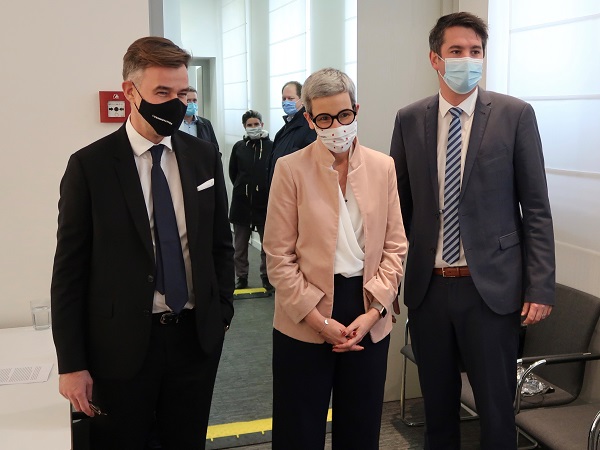 L-R: Franz Fayot, Luxembourg's Minister of the Economy; Sam Tanson, Minister of Culture; Lex Delles, Minister for Small and Medium-Sized Enterprises;
Credit: MECO
L-R: Franz Fayot, Luxembourg's Minister of the Economy; Sam Tanson, Minister of Culture; Lex Delles, Minister for Small and Medium-Sized Enterprises;
Credit: MECO
At a press conference on Friday afternoon, Luxembourg's Minister for Small and Medium-Sized Enterprises, Lex Delles, Minister of the Economy, Franz Fayot, and Minister of Culture, Sam Tanson, presented new economic support measures aimed at providing additional assistance to the sectors most affected by the COVID-19 crisis.
Minister Lex Delles presented a bill which provides for the extension of the stimulus aid within the framework of the "Recovery and Solidarity Fund for Companies" in favour of the tourism, events, culture and entertainment sectors. This aid will however have a wider scope, as it will also benefit the in-store retail sector and managers of continuing vocational training organisations.
This extended aid takes the form of monthly capital grants and lasts for a period of four months from December 2020 to March 2021. It is linked to the condition that the company has suffered a loss of monthly turnover of at least 25% and is calculated on the basis of the number of employees and self-employed workers in the company. The amount of the subsidy is €1,250 per self-employed worker and per active employee or €250 per employee in full partial unemployment during the month for which the aid is requested.
At the same time, the Minister for Small and Medium-Sized Enterprises drew up a bill to create aid in the form of a contribution to the costs for companies whose activities have been severely impacted by the COVID-19 pandemic. This financial assistance is intended for the tourism, events, culture and entertainment sectors and for managers of continuing vocational training organisations. It will be allocated in the form of monthly capital grants calculated on the basis of uncovered costs to companies which, during all or part of the period between 1 November 2020 and 30 March 2021, will have suffered a loss of monthly turnover of at least 40% compared to the corresponding month in 2019. The amount of aid is capped at €20,000 per month for a microenterprise, €100,000 per month for a small company and €200,000 per month for a medium and large company. Companies which meet both the eligibility criteria for the recovery aid and those for the contribution to uncovered costs will have to opt for the instrument which is most suited to their situation.
According to the latest forecasts from the European Commission, Luxembourg has entered an economic recession and GDP is expected to fall by 4.5% in 2020 before growing again in 2021 (+ 2.3%), only regaining its pre-crisis level in 2022 (+ 2.75%). In this context, Economy Minister Franz Fayot announced the extension of several aid schemes linked to the COVID-19 crisis: the partial unemployment scheme will be extended until the end of the first half of 2021. The terms of application of partial unemployment beyond 31 December 2020 are currently being discussed with the social partners within the economic committee.
The following aid schemes will also be extended until 30 June 2021:
- state guarantee scheme for new bank loans;
- capital grant in the form of a repayable loan of maximum €800,000;
- financial support for companies carrying out an investment or R&D project for products helping to combat the health crisis;
- aid to boost investment in the COVID-19 era.
Minister Franz Fayot also announced the extension of the Fit 4 Resilience strategic relaunch programme, initiated by the Ministry of the Economy and Luxinnovation, until 31 December 2021. The objective of this programme is to support companies in their way out of the crisis and to help to consider a longer-term development strategy, integrating a more digital, circular and regional approach.
Culture Minister Sam Tanson then recalled the harmful impact of the COVID-19 pandemic and health restrictions on the cultural sector. New aid is intended to provide more support for organisers and cultural industries for which a resumption of all activities is not yet in sight. Despite the opening of venues, museums and art galleries, professional independent and intermittent performing artists are the first to suffer from greatly reduced cultural activity. Through a grand-ducal regulation related to social measures for the benefit of workers in this sector, additional aid will be reintroduced for a period of two months (from 1 November to 31 December 2020).
This additional aid scheme guarantees in particular:
- social assistance for independent professional artists, with the possibility of paying monthly social assistance up to the minimum social wage for qualified people (instead of 50% of the minimum social wage for qualified people in "normal" times);
- additional daily allowances (up to 20 per month) for intermittent entertainment workers in the event of involuntary inactivity, compared to the 121 daily allowances provided for in “normal” times.
The cost of this measure is estimated at €480,000. Between March and August 2020, a first period of this scheme saw the release of around €930,000 in additional aid for the benefit of professional independent and intermittent performing artists.








